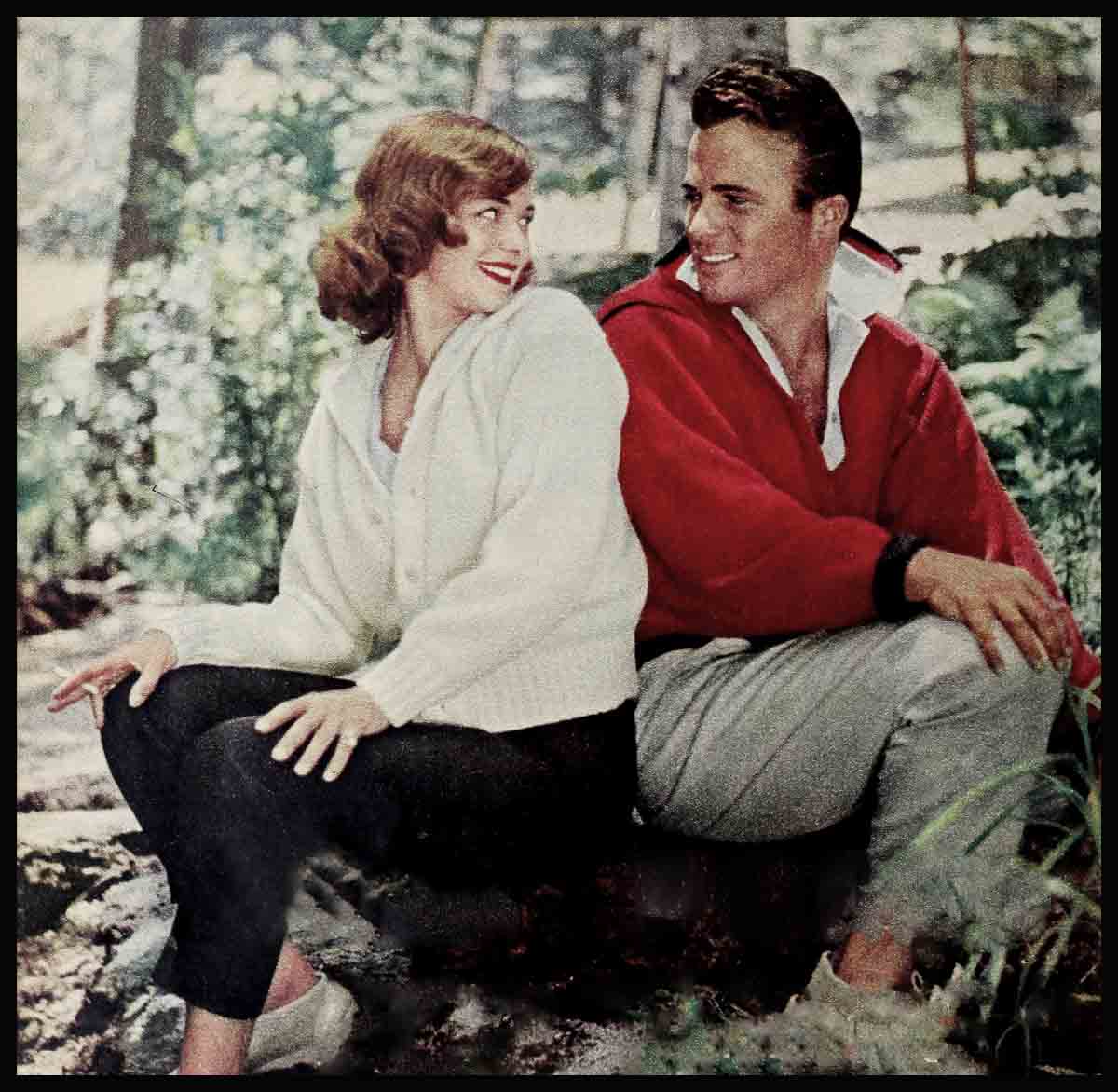
Judi Meredith Explains: Why I Posed For These “Phony Romance Pictures”
Say that again! Me pose with Barry Coe—that conceited snob? Are you kidding?”
Honest, but those were my very words to the MODERN SCREEN photographer the night he phoned and asked me to come to Lake Arrowhead the next morning and do some water-ski shots with Mr. Big-Shot, Handsome, I Can’t Stand You, How Can You Stand Yourself—Coe . . . as I not so affectionately thought of Barry at the time.
Why?
Womanly pride—that’s why!
Oh, it made me so boiling mad every time thought of it, that first and only time I’d ever met him. It had been about a month earlier, at a party following a big movie premiere at the Beverly-Hilton Hotel. I’d gone with my date, Floyd Simmons, and we’d sat at a table with six very good friends—none of them in show business, by the way. A couple of tables away sat a very good-looking young fellow and his date—a New York girl—alone. They’d come in a little while after most of the others. And as soon as the other girls at our table saw the newcomer (male!) they started going ga-ga-ga. To be truthful, I let out with a ‘ga’ or two myself—but I was about two years older than these other girls and felt I should act just a little more sophisticated.
One of the girls at our table, a very lovely, wide eyed-type girl, said to me, “Judi, do you know who he is?”
“I think,” I said, “I think he’s Barry Coe, the young 20th Century-Fox actor who played in Peyton Place.”
“That’s right!” the girl said, more and more excited. “Oh, Judi, do you think you could get me his autograph on this menu? I’m just crazy about him.”
“Why don’t you go over to him yourself and ask?”
“I’m ashamed,” the girl said.
I tried to persuade her, but she wouldn’t budge. “All right,” I said, getting up, “I’ll do it . . . And to show you that actors are really people—and Barry Coe over there looks like ‘people,’ I’ll even get him to come over and say hello to you.
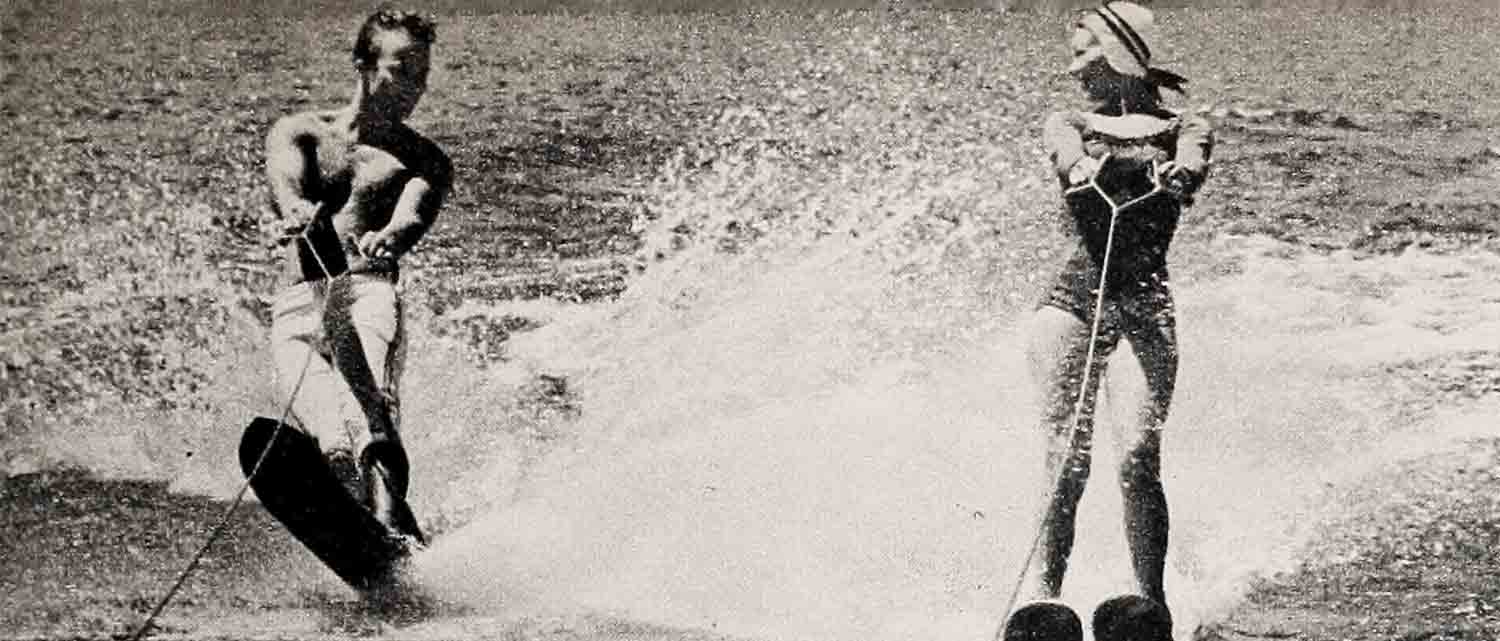
“Barry,” I said, when I got to his table, very informal about the whole thing, “I’m Judi Meredith.”
“Oh?” Barry said, as if he couldn’t care less.
I told him about my friend and how she would like his autograph.
Without saying anything, he got out a pen and signed the menu.
Then I asked him if he’d mind, when he had a few minutes, coming over to the table to say hello.
“If it’s all the same to you, I’d rather not,” he started to say. “I. . . .”
“Okay,” I said, interrupting him, realizing I’d figured him wrong. I nodded, picked up the menu and began to walk away. “That’s perfectly okay,” I said.
And it was as I was walking away that I heard his date ask, “Who’d she say she was?”
“Judi Meredith,” I heard Barry answer.
“Hmmmm,”’ I heard his date hmmmm. “She acts just like all the phony ambitious glamour girls out here—piled into one.”
I never got to hear what Barry said to that. But I was furious with him. She’d said it—that girl. And yet for some reason, I was mad at him.
And I stayed mad all that month.
And I didn’t ease up on being mad when the MODERN SCREEN photographer suggested those lake pictures with young Mr. Coe.
“I’m sorry,” I said, over and over, the answer is no.”
The photographer caught on all right. But he gave one more try.
“Judi,” he said, “there’s not a girl in town who can stand on water skis the way you can. And without you, I’m sunk on this assignment.”
“Well—” I started.
“Sunk!” the photographer repeated.
Suddenly I felt awful. “Well,” I said again, “all right, I’ll do it—for you. But let me warn you, I’m going to be having an awful time and you’ll be lucky if you get one decent smile out of me.”
The photographer said thanks. He told me that Barry would be around to pick me up at seven o’clock the next morning—that the two of us would drive out together and meet him, the photographer, at the lake.
Before I could object, he hung up.
And I realized that there was nothing for me to do now but go to bed, madder than ever. . .
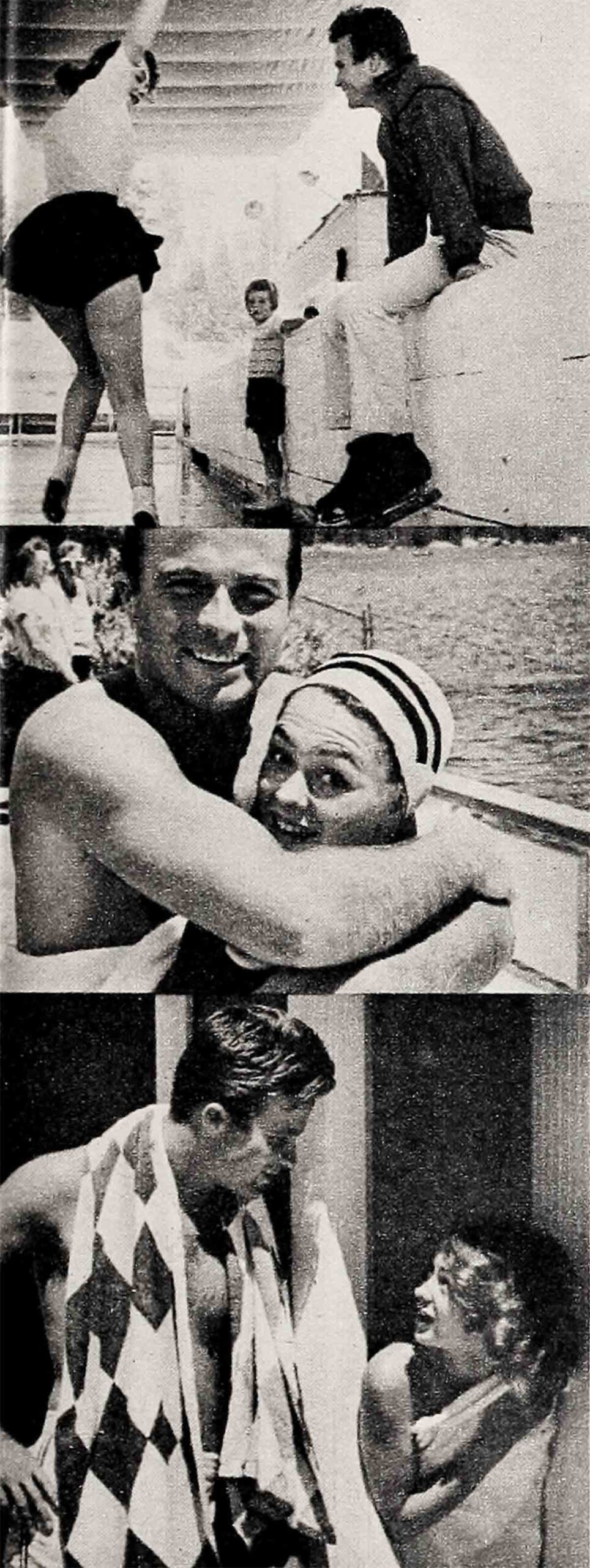
It was at exactly 6:00 a.m. the following morning when the car-beeps woke me up. Groggily, I got out of bed and walked over to the window. “It can’t be him, already,” I remember thinking to myself. But as i looked out the window I saw that it was indeed him. Mr. Barry Coe himself.
“Hey,” he called up at me, still beeping away, “come on down and let’s get going.”
“But you’re an hour early,” I called back down.
“So what?” he said. “It’s a great morning and we can spend some time driving around the lake before we meet up with the photographer.”
“Oh, fine,” I muttered to myself. I was very tempted at this point to march back to bed and stay there for another hour and just make him sit there in that car and wait till the time this glorious day of ours wasscheduled to begin.
But then I realized that I was awake already and I remember thinking that maybe the sooner we got this whole thing started, the sooner we could get it over with. So I said okay I’d be down soon.
When I got to the car I was very surprised. Barry Coe was actually smiling.
“We’ve met, haven’t we?” he asked.
“We sure have!” I wanted to say. But seeing he didn’t remember exactly where or when, I thought I’d have some private fun. “I think so,” I said, very casually.
“Well, c’mon,” Barry said, starting the car, “let’s find a place where we can have some breakfast and then head for the lake.”
The first half hour was very confusing. I mean, I’d expected Barry to be one way—the wrong way; and here he was now, smiling away, excited about this trip we were making, trying so hard to make all kinds of conversation.
But I had by no means gotten over being mad from that night at the Beverly-Hilton—that night he obviously didn’t remember now. I spoke very little as we drove—saying yes and no and uh-huh and huh-uh to all his questions and nipping every start at any conversation right in the bud.
Besides, I thought to myself, Why the nice-act all of a sudden, Mr. Coe? I remember how you acted one night, not nice at all. So why this energetic try at making a good impression all of a sudden? Why don’t you just relax and act like your natural self? Annoying as that is, at least it’s honest!
When we got to the restaurant—a little diner just off the highway—I changed my tactics a little. Suddenly seeing Barry sitting there across the table from me, I remembered him sitting at the hotel that night with that girl. And her words—about my being a common, ambitious glamour type—came flashing back to my mind.
Ohhhhh—as always, I got so mad when I thought of those words. And now I really felt like letting loose. I didn’t know exactly what to do. So I thought, I know, I’ll act just like that kind of girl now and see how he likes it.
For the next ten minutes, I was terrible.
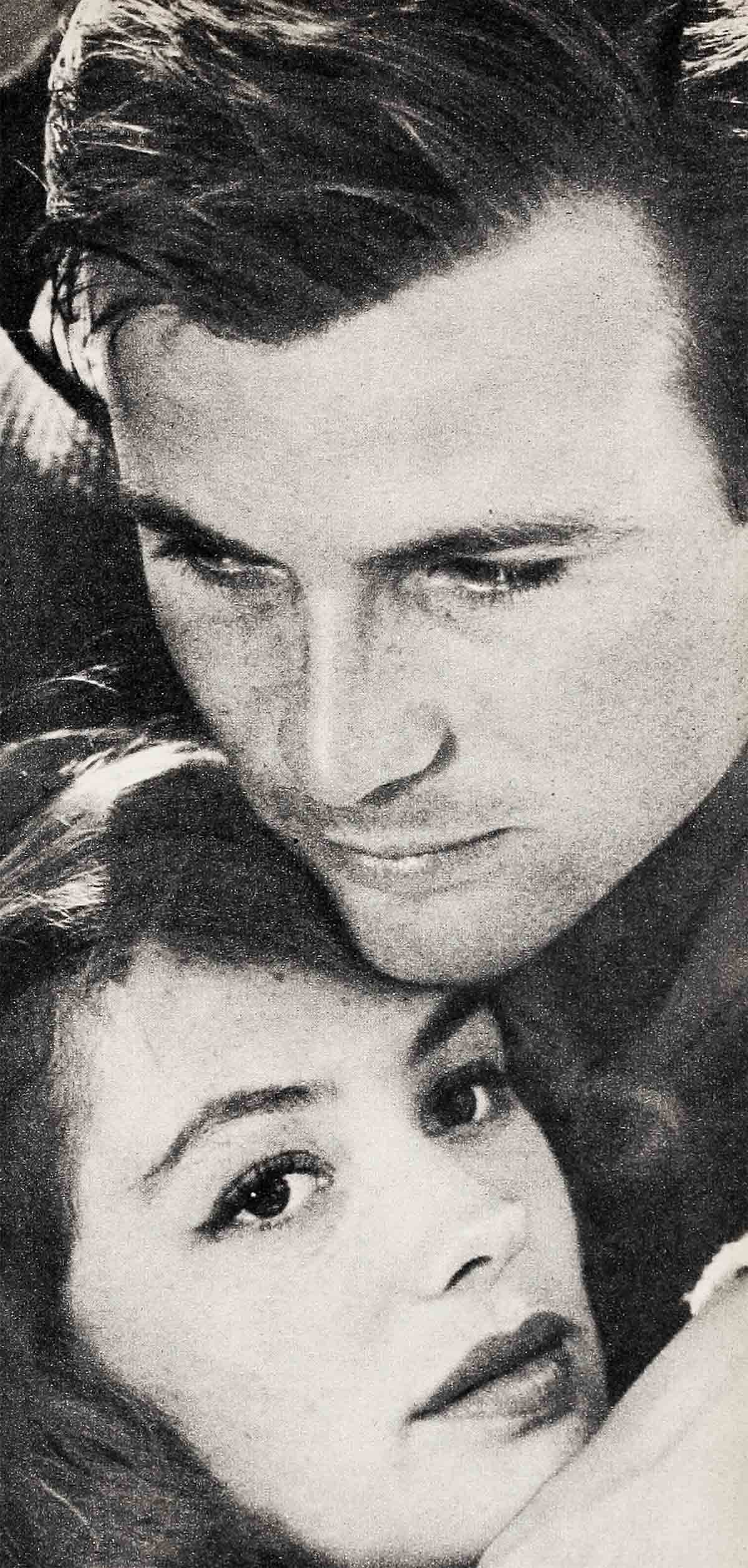
The ambitious act
I began to talk and I talked only about myself. I bragged. I told Barry how I had been such a clever young girl back in Portland, Oregon, when I was little. And how Id learned to ice skate so young. And how Id been signed up by the Shipstad and Johnson Ice Follies people at fifteen. And how I’d toured all this country and Canada till I was seventeen. I didn’t mention that at seventeen I’d been in an accident and broken my back and been laid up for a year—with everyone wondering if I would ever be able to walk again, let alone skate. No, I didn’t say anything about this, because it was sympathy stuff and I didn’t want any sympathy now. I just wanted to be gay and glamorous and ambitious sounding. Then I went on to tell about how Id alien into television acting and then movies. I made it sound so easy that it was ridiculous. And I ended up by saying, “But of course, you must have had it easy, too.”
“Pretty easy, I guess,” Barry said, shrugging. “But—” And then he went on to tell me a little about himself, about how he’d always wanted to be an actor, ever since he was a kid in Los Angeles, his birthplace . . . about how he’d decided somewhere along the line that no, acting wasn’t for him, not after that school play fiasco, how then he’d gone in for business administration courses and had actually graduated from UCLA with a diploma in that subject a few years ago.
“What about that school play fiasco?” I asked, surprised that Mr. Barry Coe would admit to something in his life that wasn’t exactly great.
“Oh,” Barry said, “I was given the romantic lead in a production of You Cant Take It With You. I played Tony. And, believe me, I wasn’t a very good Tony. And as a lover, I guess I stank. At least, that’s what one of the critics said.”
He’d been looking down into his coffee as he talked. And now he looked up. And I could see that he hadn’t said what he’d just said so that I could say, “Oh, I’m sure you were very good!” or some such thing. I could see that he was just being very nice and honest about something that had obviously hurt him at the time and that he was telling me this because . . . because he kind of liked me . . . ?
I quickly gulped down the rest of my coffee.
And as I did I noticed that Barry was still looking at me—and I blushed.
“Hadn’t we better get going?” I found myself saying.
“Sure,” Barry said.
And then I found myself getting up and looking up and smiling into this face I’d disliked so much for the past month.
And I wondered, Could I have been wrong?
I still wasn’t sure.
But I did begin wondering. . . .
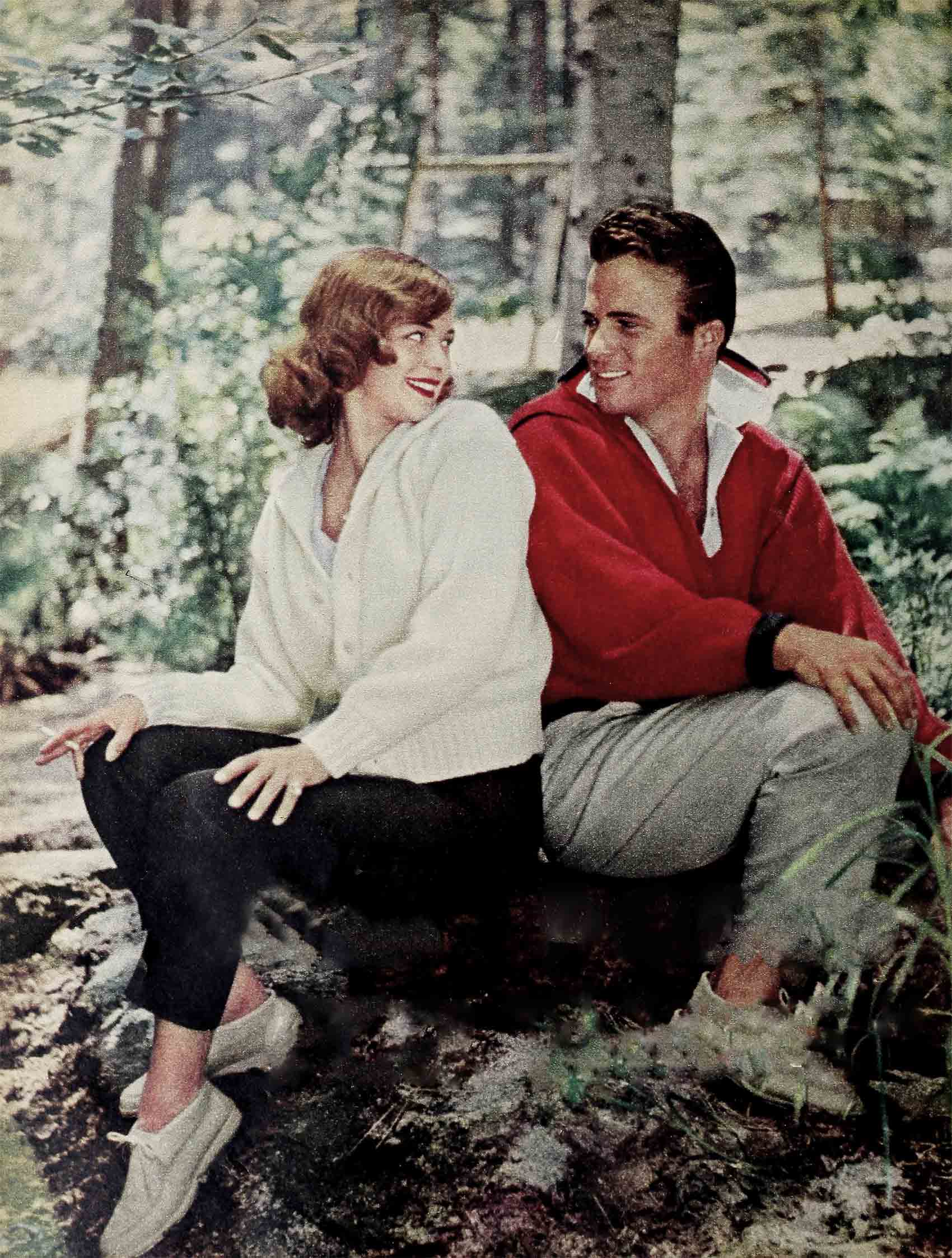
Up at the lake
The rest of the drive to the lake was fun. Barry talked, I talked, we turned on the radio, we hummed along with the music, we talked some more. . . and yes, it was really fun.
But the best part came when we got to the lake. I’ve always been partial to fellows who’ve liked what I like—the great outdoors I mean. I love Nature so much I could fall in love with a tree. And here was Barry now, showing me around this beautiful lake. He told me how he’d lived here one summer as a kid and all the great things he’d done and how someday he’d like to come back and build a tiny cabin here. “A cabin with a tin roof,” he said, “so I can hear the real sound of rain when it comes pouring down.” And as he talked and as we drove I found myself liking him more and more and more. . . .
By the time the MODERN SCREEN photographer showed up—about an hour and a half later—the first miracle of the day had happened. Barry and I were friends.
The next six or seven hours were a ball. Just turn back to the pictures at the beginning of my story and you can see for yourself the great time we had—swimming, water-skiing, ice-skating.
And when the photographer, more pooped than we were, finally said, “Okay, kids, I think that’s it for today!”—I felt suddenly very sad.
I found myself wishing Barry would say something like, “How about it, Judi, would you like to stick around for dinner?”
Well, he didn’t ask me in quite that way. In fact, he hemmed and hawed over it for a while, as if he thought I might say no.
But, finally, I helped him along with the invitation and said, “Why yes, that might be nice.”
Instead of going to a restaurant, Barry suggested that we drive back into town, buy a couple of steaks and fixin’s and bring them back to cook over an old, abandoned stone fireplace in the woods.
I’m not exactly queen of the kitchen at home. But there at. Arrowhead, that bit of cool green heaven on earth, I turned out to be pretty good. At least, the steaks didn’t burn too badly, I mean. And the beans heated up fairly well. And the pineapple sliced nicely. And to hear Barry rave after we were all through, you’d have thought a caterer from Romanoff’s Restaurant had come and prepared the meal especially for us.
And then lying back against that big pine tree the way we did after we were finished and looking up at the sky! You’d have thought that we were back on some gorgeous make-believe movie set looking up at the most beautiful dusky-blue prop ever painted to the order of some high-paying producer who wanted things right, just right.
Hesitantly, he took my hand in his. “Like you,” he whispered.
I wanted to say something back, right away. But I couldn’t think of a thing to say except thank you, and how happy I was right now—happy that the day had turned out so wonderfully, happy that I was where I was right now.
But before I even had a chance to say a word, Barry bent over to kiss me.
Suddenly, I did say something. “No!”
I saw the hurt come into Barry’s eyes, but I tried to ignore that hurt.
And when he asked me why I’d said no, I told him.
Suddenly, I told him about that first night we’d met. I reminded him of that night, of exactly what had happened when I’d gone over to him to ask him to sign the menu. I reminded him that he’d been rude and that somehow the image of his rudeness kept clinging to my mind—that I couldn’t help remembering it, but I did.
“That night. . . .” Barry said, remembering now, too. “That night I was sick, Judi. Believe me. During the premiére I got an attack of something and by the time I got to the hotel I had a fever—and to get up from that chair . . . Well, all I wanted to do when I got up was to go home, not to go over and introduce myself to some girl I didn’t know and who I just didn’t feel like meeting. Believe me, Judi, I was sick and—”
“And,” I interrupted him, “that remark your date made as I was leaving the table!” I gave him the details of the remark, word for word. “Were you too sick to laugh along with her after she’d talked about me like that?” I asked.
“Laugh along with her?” Barry said. He shook his head. “Judi,” he said, “do you know what I told her after that crack of hers? Did you hear me say what I told her that night?”
I didn’t answer.
“I told her, Judi,” Barry said, “that I was embarrassed to hear a date of mine talk like that, that I didn’t ever want to hear her talk like that again . . . As it turned out, Judi, I never did hear her talk like that again. Because I’ve never seen her again, not since that night. Far as I know, she’s gone back to New York and will never come back.”
I’ve learned one thing in my life. I’ve learned that I can tell when somebody is telling the truth or lying.
I knew Barry was telling the truth.
I told him so.
And then I said nothing and waited to see if he would kiss me again.
He did.
And then the second miracle of that beautiful day happened. For then we fell in love. . . .
I don’t know how to end this story of mine and Barry’s.
I could tell you about the marvelous times we’ve been having together ever since that day at the lake. I could tell you lots of marvelous things.
But there just isn’t the space.
And so I guess maybe the best way to end is to say—I hope it never ends. . . .
THE END
Watch for Judi Meredith in U-I’s WILD HERITAGE. Barry is in THE BRAVADOS for 20th.
It is a quote. MODERN SCREEN MAGAZINE NOVEMBER 1958




